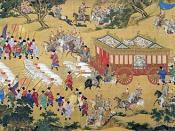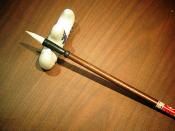The Imperial Civil Exam System
The Chinese civil examination system from 600 AD to the industrial revolution, was the most progressive system of its kind in the world. Theoretically the government's exams allowed any Chinese man an equal chance at even the highest positions in politics and society. In practice this may not have always been the case, but at least all social barriers were removed from one's path. Only economic realities may have put individuals in unequal positions, but that remains true of our modern society.
The purpose of this paper is to discuss the Imperial Chinese civil service exam system and the impacts it had on the Chinese political system. To do this, a brief background of Confucianism and the Chinese educational system will be given. Next, the Exam System can be dealt with, as it began in the Han Dynasty (206 B.C.-220 A.D.) through to its end during the neo-Confucian Qing Dynasty (1644-1911A.D.).
Finally, how this system has shaped the Chinese political vantage will be discussed.
Master Kung or Kung Fu-tzu (551-479 BC) Master Kung lived during what is known as the Eastern Zhou period. This period of political disunity from 770 BC to 221 BC sparked an intellectual outpouring in China known as the era of a "hundred schools." Wandering teachers would move from state to state offering their services and ideas to patrons, about how to improve their rule. Confucius was just one of these traveling teachers who thought his ideas, if followed, could eventually bring the political conflict and wars in China to an end. During his lifetime, Confucius was never able to put his ideas into practice, and he died thinking himself a failure. His ideas, though, were remembered by his devoted followers, and recorded after his death in what is called the...


